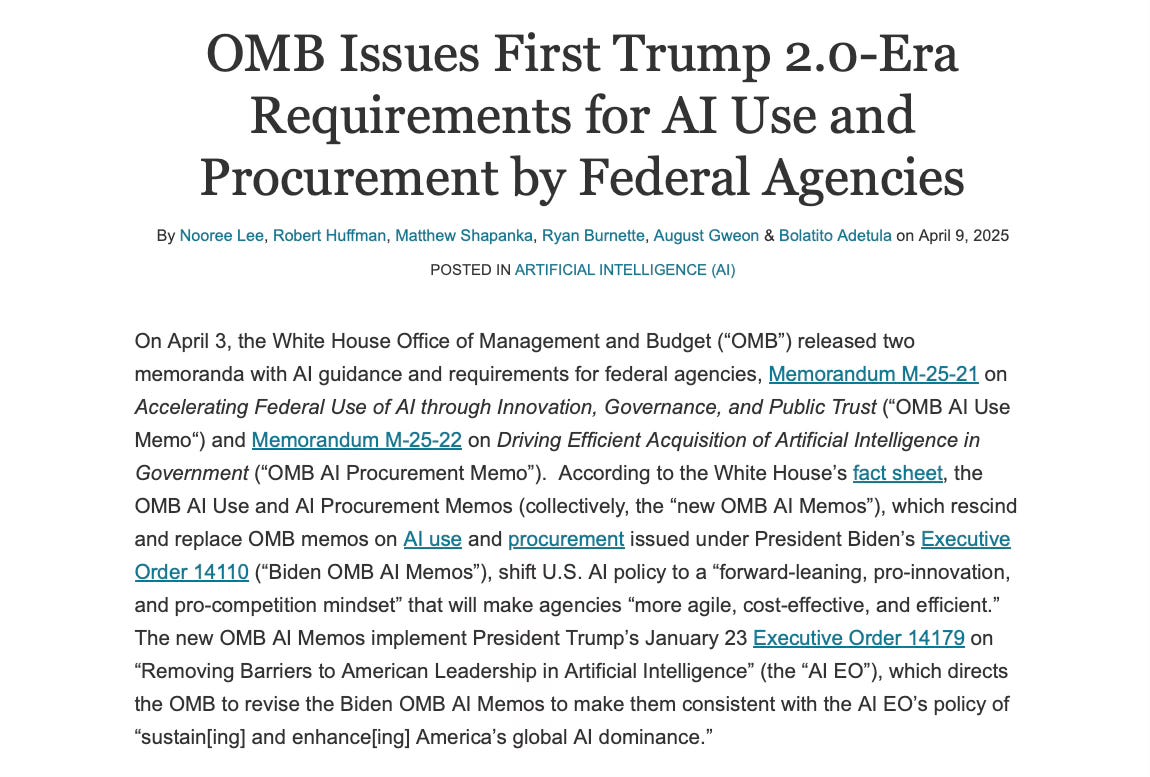- Pascal's Chatbot Q&As
- Posts
- OMB Memoranda: Careful consideration of licensing rights is highlighted as particularly important for AI systems.
OMB Memoranda: Careful consideration of licensing rights is highlighted as particularly important for AI systems.
Contracts must include terms that permanently prohibit using non-public government data to train publicly or commercially available AI algorithms without explicit agency consent.
Analysis of the article "OMB Issues First Trump 2.0-Era Requirements for AI Use and Procurement by Federal Agencies" and the associated OMB memoranda.
by Claude
Here are the key topics that are relevant to content and rights owners and scholarly publishers:
Intellectual Property (IP) Rights
The OMB memoranda emphasize protecting IP rights when government agencies procure AI systems
Agencies must establish clear contractual terms that delineate ownership and IP rights between government and contractors
Careful consideration of licensing rights is highlighted as particularly important for AI systems
Data Ownership and Usage
The memoranda require agencies to develop processes for addressing data ownership in AI procurement
Contracts must include terms that permanently prohibit using non-public government data to train publicly or commercially available AI algorithms without explicit agency consent
Data handling guidance must ensure vendors only collect and retain agency data when reasonably necessary
Documentation and Transparency Requirements
Agencies are encouraged to prioritize obtaining documentation from vendors that facilitates transparency and explainability
This includes documentation of data used in AI design, development, training, and testing
American-Made AI Provisions
The policy encourages agencies to "invest in the American AI marketplace" and maximize use of AI products and services developed and produced in the United States
This could affect content providers and publishers with international operations or non-US development teams
Vendor Lock-in Prevention
The memoranda emphasize avoiding vendor lock-in through requirements for data and model portability
Knowledge transfer requirements could affect how content is licensed and maintained
Risk Management for High-Impact AI
AI systems affecting access to education, information, and publishing might be classified as "high-impact" and subject to additional requirements
Publishers working with government agencies may need to comply with these enhanced requirements
Sharing of Agency Data and AI Assets
Agencies are encouraged to share and reuse data and AI assets across government
Custom-developed code must be proactively shared across federal government in many cases
Pre-deployment Testing and Monitoring
Requirements for ongoing monitoring of AI systems could affect how content is processed and used in government AI applications
Recommendations for Content Rights Owners and Scholarly Publishers:
Review IP Protection Strategies: Ensure your licensing agreements explicitly address AI training and fine-tuning. Consider developing specialized licensing terms for government contracts that protect your content while enabling legitimate government use.
Prepare for Data Documentation Requirements: Be ready to provide detailed documentation about data used in AI development, including provenance and potential biases. Publishers should establish processes to track and document data lineage.
Develop Transparency Standards: Create standards for explaining how your AI systems work, particularly if they process or generate scholarly content. Publishers should be prepared to document model capabilities and limitations.
Address "American-Made" Requirements: Publishers with international operations should evaluate whether their AI development processes align with the "American-Made" emphasis. Consider documenting where components of your AI systems are developed.
Establish Data Portability Protocols: Develop standardized formats and processes for data portability that protect your IP while allowing government agencies to avoid vendor lock-in.
Implement Risk Assessment Frameworks: Create a framework for assessing whether your AI applications might be considered "high-impact" in government contexts and prepare documentation accordingly.
Monitor Policy Developments: The memoranda indicate a shift in federal AI policy. Publishers should actively monitor for further guidance, particularly around NIST standards, which were notably de-emphasized in the new memoranda.
Review Contracts for Data Protection: Ensure government contracts have appropriate safeguards against unauthorized use of your content for training publicly available AI models.
